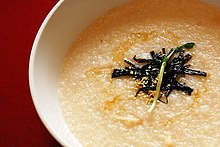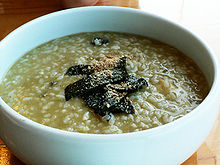


Jeonbok-juk made without the abalone's internal organs
| |
| Type | Juk |
|---|---|
| Place of origin | Korea |
| Serving temperature | warm |
| Main ingredients | Abalone, rice |
Food energy | 58 kcal (243 kJ)[1] |
| Korean name | |
| Hangul | 전복죽 |
|---|---|
| Hanja | 全鰒粥 |
| Revised Romanization | jeonbok-juk |
| McCune–Reischauer | chŏnbok-chuk |
| IPA | [tɕʌn.bok̚.t͈ɕuk̚] |
Jeonbok-juk[2] (전복죽; 全鰒粥), or abalone rice porridge,[2] is a variety of juk (죽; 粥), or Korean porridge, made with abalone and white rice. Abalone is regarded as a high-quality ingredient in Korean cuisine and was often presented as a gift to the king of Korea.[3] The dish is a local specialty of Jeju Island, where abalones are commonly harvested. Jeonbokjuk is known as not only a delicacy but also as a nutritional supplement and digestive aid, especially for ill patients or elderly people.[3][4] Jeonbokjuk can be made with or without the abalone's internal organs. The former type of jeonbokjuk has a green tinge, while the latter is more ivory in color.[5]
Abalones are first prepared by cleaning with a brush in water, and the flesh is taken out from the flat and middle of the shells with a small kitchen knife. The internal organs are removed separately from the flesh, taking care not to damage them. The flesh is slightly parboiled in a pot of boiling water and then thinly sliced. Rice is soaked in a bowl of water for 3 to 4 hours before cooking. The abalone flesh is stir-fried in a pot over a medium flame with sesame oil, with the soaked rice then added. After stir-frying for a while, water is poured into the pot, and the dish is cooked at a higher temperature. Constant stirring prevents the ingredients from sticking to the bottom of the pot. After the dish has come to a boil, the heat is lowered and allowed to simmer. The dish is seasoned with salt, or ganjang (Korean soy sauce).[6]
